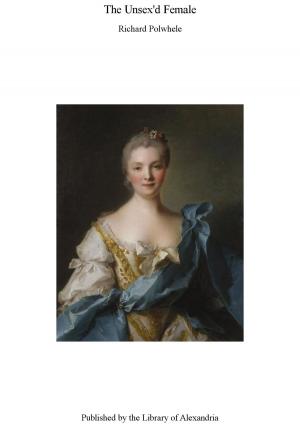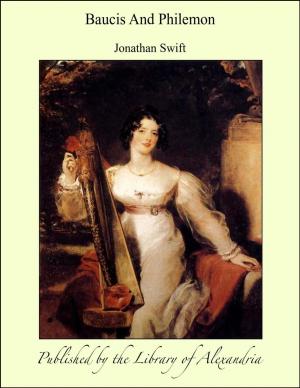| Author: | William Whewell | ISBN: | 9781465607812 |
| Publisher: | Library of Alexandria | Publication: | March 8, 2015 |
| Imprint: | Language: | English |
| Author: | William Whewell |
| ISBN: | 9781465607812 |
| Publisher: | Library of Alexandria |
| Publication: | March 8, 2015 |
| Imprint: | |
| Language: | English |
Although the opinions presented in the following Essay are put forwards without claiming for them any value beyond what they may derive from the arguments there offered, they are not published without some fear of giving offence. It will be a curious, but not a very wonderful event, if it should now be deemed as blamable to doubt the existence of inhabitants of the Planets and Stars, as, three centuries ago, it was held heretical to teach that doctrine. Yet probably there are many who will be willing to see the question examined by all the light which modern science can throw upon it; and such an examination can be undertaken to no purpose, except the view which has of late been generally rejected have the arguments in its favor fairly stated and candidly considered. Though Revealed Religion contains no doctrine relative to the inhabitants of planets and stars; and though, till within the last three centuries, no Christian thinker deemed such a doctrine to be required, in order to complete our view of the attributes of the Creator; yet it is possible that at the present day, when the assumption of such inhabitants is very generally made and assented to, many persons have so mingled this assumption with their religious belief, that they regard it as an essential part of Natural Religion. If any such persons find their religious convictions interfered with, and their consolatory impressions disturbed, by what is said in this Essay, the Author will deeply regret to have had any share in troubling any current of pious thought belonging to the time. But, as some excuse, it may be recollected, that if such considerations had prevailed, this very doctrine, of the Plurality of Worlds, would never have been publicly maintained. And if such considerations are to have weight, it must be recollected, on the other hand, that there are many persons to whom the assumption of an endless multitude of Worlds appears difficult to reconcile with the belief of that which, as the Christian Revelation teaches us, has been done for this our World of Earth. In this conflict of religious difficulties, on a point which rather belongs to science than to religion, perhaps philosophical arguments may be patiently listened to, if urged as arguments merely; and in that hope, they are here stated, without reserve and without exaggeration. All speculations on subjects in which Science and Religion bear upon each other, are liable to one of the two opposite charges; that the speculator sets Philosophy and Religion at variance; or that he warps Philosophy into a conformity with Religion. It is confidently hoped that no candid reader will bring either of these charges against the present Essay. With regard to the latter, the arguments must speak for themselves. To the Author at least, they appear to be of no small philosophical force; though he is quite ready to weigh carefully and candidly any answers which may be offered to them. With regard to the amount of agreement between our Philosophy and Religion, it may perhaps be permitted to the Author to say, that while it appears to him that some of his philosophical conclusions fall in very remarkably with certain points of religious doctrine, he is well aware that Philosophy alone can do little in providing man with the consolations, hopes, supports, and convictions which Religion offers; and he acknowledges it as a ground of deep gratitude to the Author of all good, that man is not left to Philosophy for those blessings; but has a fuller assurance of them, by a more direct communication from Him. Perhaps, too, the Author may be allowed to say, that he has tried to give to the book, not only a moral, but a scientific interest; by collecting his scientific facts from the best authorities, and the most recent discoveries. He would flatter himself, in particular, that the view of the Nebulæ and of the Solar System, which he has here given, may be not unworthy of some attention on the part of astronomers and observers, as an occasion of future researches in the skies.
Although the opinions presented in the following Essay are put forwards without claiming for them any value beyond what they may derive from the arguments there offered, they are not published without some fear of giving offence. It will be a curious, but not a very wonderful event, if it should now be deemed as blamable to doubt the existence of inhabitants of the Planets and Stars, as, three centuries ago, it was held heretical to teach that doctrine. Yet probably there are many who will be willing to see the question examined by all the light which modern science can throw upon it; and such an examination can be undertaken to no purpose, except the view which has of late been generally rejected have the arguments in its favor fairly stated and candidly considered. Though Revealed Religion contains no doctrine relative to the inhabitants of planets and stars; and though, till within the last three centuries, no Christian thinker deemed such a doctrine to be required, in order to complete our view of the attributes of the Creator; yet it is possible that at the present day, when the assumption of such inhabitants is very generally made and assented to, many persons have so mingled this assumption with their religious belief, that they regard it as an essential part of Natural Religion. If any such persons find their religious convictions interfered with, and their consolatory impressions disturbed, by what is said in this Essay, the Author will deeply regret to have had any share in troubling any current of pious thought belonging to the time. But, as some excuse, it may be recollected, that if such considerations had prevailed, this very doctrine, of the Plurality of Worlds, would never have been publicly maintained. And if such considerations are to have weight, it must be recollected, on the other hand, that there are many persons to whom the assumption of an endless multitude of Worlds appears difficult to reconcile with the belief of that which, as the Christian Revelation teaches us, has been done for this our World of Earth. In this conflict of religious difficulties, on a point which rather belongs to science than to religion, perhaps philosophical arguments may be patiently listened to, if urged as arguments merely; and in that hope, they are here stated, without reserve and without exaggeration. All speculations on subjects in which Science and Religion bear upon each other, are liable to one of the two opposite charges; that the speculator sets Philosophy and Religion at variance; or that he warps Philosophy into a conformity with Religion. It is confidently hoped that no candid reader will bring either of these charges against the present Essay. With regard to the latter, the arguments must speak for themselves. To the Author at least, they appear to be of no small philosophical force; though he is quite ready to weigh carefully and candidly any answers which may be offered to them. With regard to the amount of agreement between our Philosophy and Religion, it may perhaps be permitted to the Author to say, that while it appears to him that some of his philosophical conclusions fall in very remarkably with certain points of religious doctrine, he is well aware that Philosophy alone can do little in providing man with the consolations, hopes, supports, and convictions which Religion offers; and he acknowledges it as a ground of deep gratitude to the Author of all good, that man is not left to Philosophy for those blessings; but has a fuller assurance of them, by a more direct communication from Him. Perhaps, too, the Author may be allowed to say, that he has tried to give to the book, not only a moral, but a scientific interest; by collecting his scientific facts from the best authorities, and the most recent discoveries. He would flatter himself, in particular, that the view of the Nebulæ and of the Solar System, which he has here given, may be not unworthy of some attention on the part of astronomers and observers, as an occasion of future researches in the skies.















